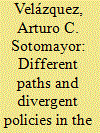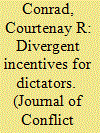| Srl | Item |
| 1 |
ID:
095611


|
|
|
|
|
| Publication |
2010.
|
| Summary/Abstract |
This article asks whether international law is moving towards a more unified constitutional order or whether differentiated types of constitutional processes are emerging. We study the sequencing and ratification pace of 32 'quasi-constitutional' international agreements containing procedural guidelines for inter-state relations and fundamental human rights provisions for individuals drawn up between 1945 and 2007. We do so in a comparative and quantitative fashion applying sophisticated statistical tools, namely event history techniques combined with counting processes. On the basis of our multi-treaty framework, the findings do not lend support to a unified and quick process of global constitutionalisation. Rather, they provide evidence for the idea of a 'multi-speed globe' of differentiated constitutionalisation. We also make a first attempt to study antecedents to global constitutionalisation. Our findings show that processes of global constitutionalisation vary across regime types and world regions (while there is no effect for new and old states).
|
|
|
|
|
|
|
|
|
|
|
|
|
|
|
|
| 2 |
ID:
089345


|
|
|
|
|
| Publication |
2009.
|
| Summary/Abstract |
How can we explain foreign policy variation among UN member states? Brazil and Mexico are the most likely cases for international primacy in the UN system, given their territorial dimension, demographic tendencies, economic importance, geopolitical location and relative weight in Latin America. Yet, despite their structural similarities, their policies and behaviour in the UN system have varied, both in terms of engagement with the Security Council and commitment regarding peacekeeping. By comparing two of Latin America's most influential countries, this study identifies the underlying conditions and mechanisms that explain their differences in behaviour and policy in the UN. In particular, this article analyses and contrasts how geopolitics and civil-military relations in Brazil and Mexico affect their incentives to participate in international organizations and their overall international commitment to peace.
|
|
|
|
|
|
|
|
|
|
|
|
|
|
|
|
| 3 |
ID:
128959


|
|
|
|
|
| Publication |
2014.
|
| Summary/Abstract |
Although they are arguably the worst violators of human rights, dictators sometimes commit to international human rights treaties like the United Nations Convention Against Torture (CAT) to appease their domestic opposition. Importantly, however, executives facing effective judiciaries must anticipate ex post costs that can arise when international treaties are likely to be enforced domestically. This suggests that one domestic institution-a political opposition party-may provide a dictator with incentives to commit to international human rights treaties and violate human rights, while another-an effective domestic judiciary-may constrain the dictator's ability to violate human rights and incentivize him to avoid international commitment. How do dictators make choices about commitment to human rights law and respect for human rights when they face conflicting domestic incentives? Furthermore, how do these divergent incentives affect compliance when dictators do commit to international treaties? In this article, I argue that the domestic incentives dictators face to support the CAT and engage in torture are moderated in countries with effective domestic judiciaries.
|
|
|
|
|
|
|
|
|
|
|
|
|
|
|
|